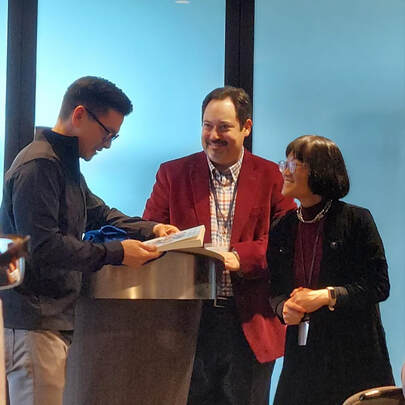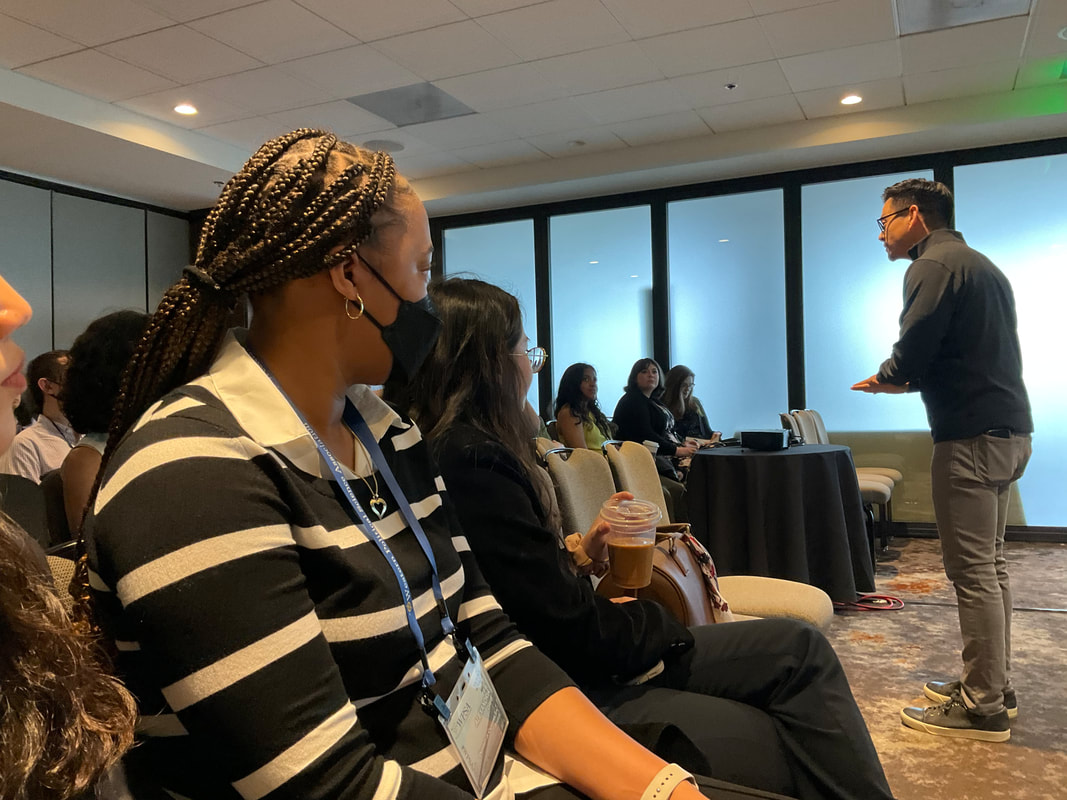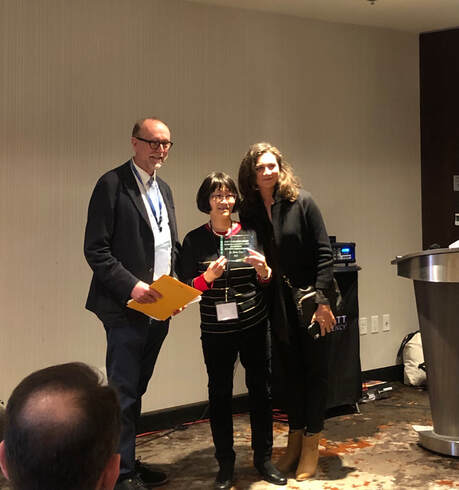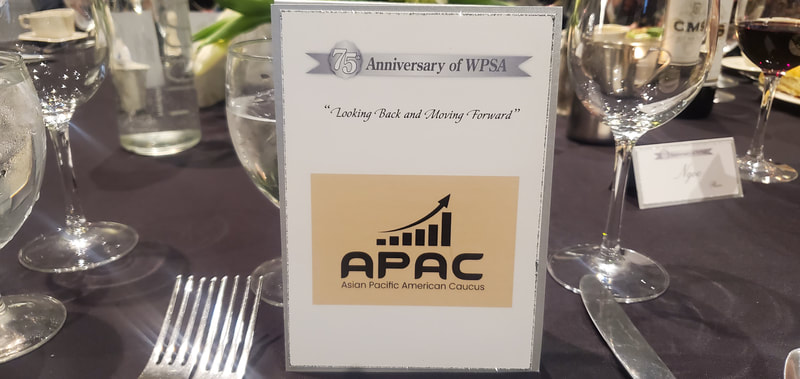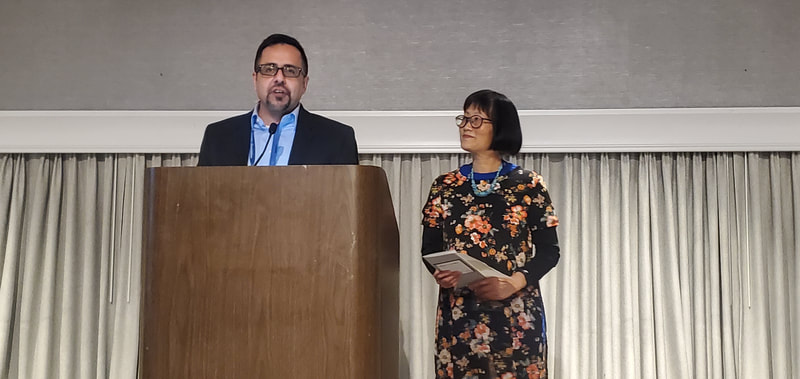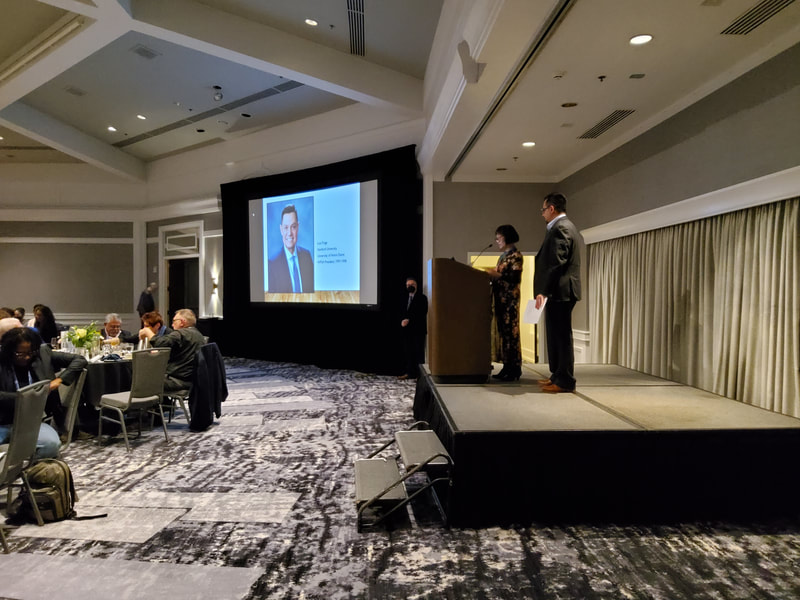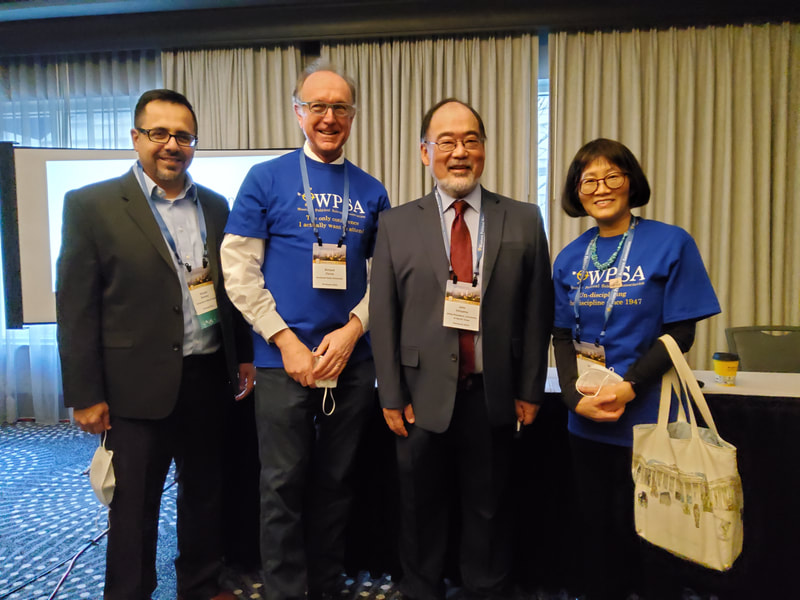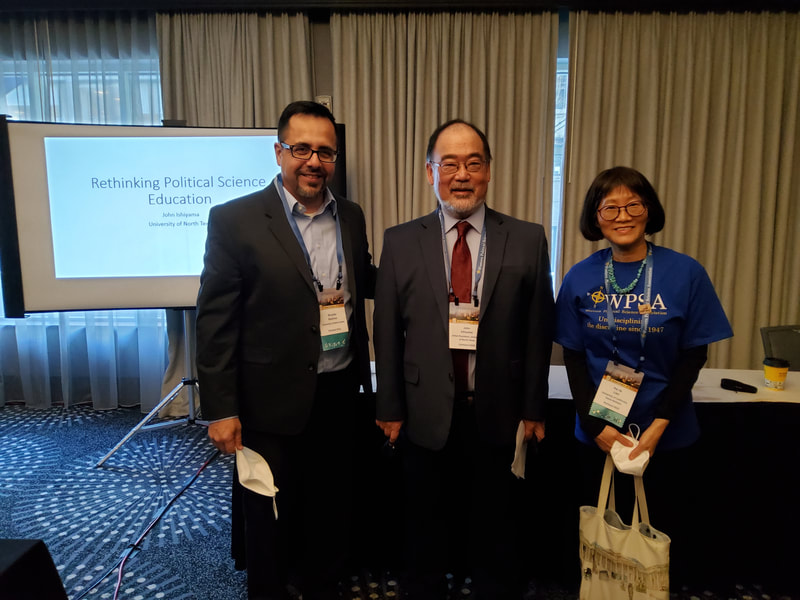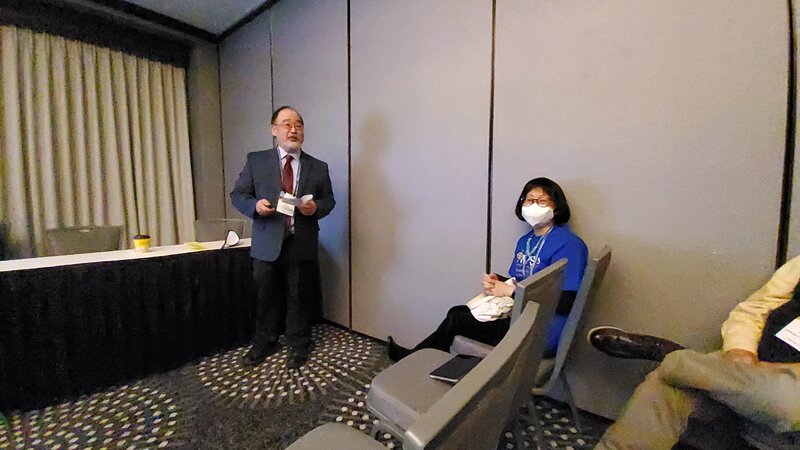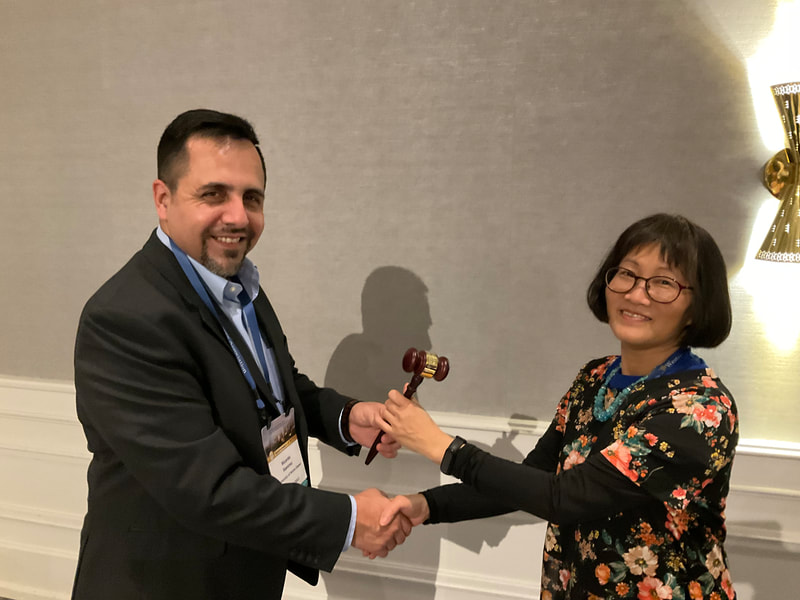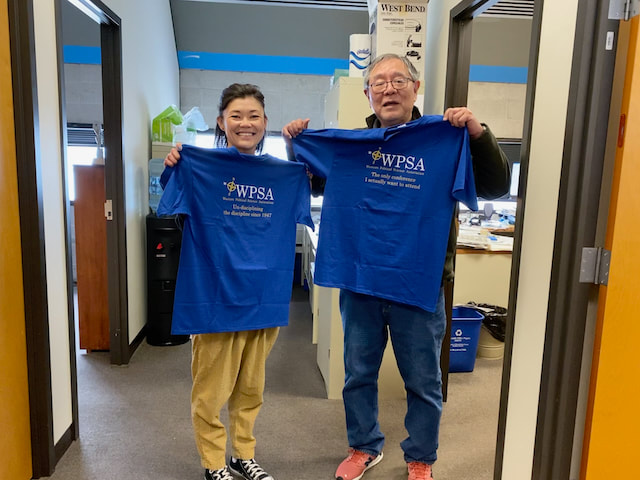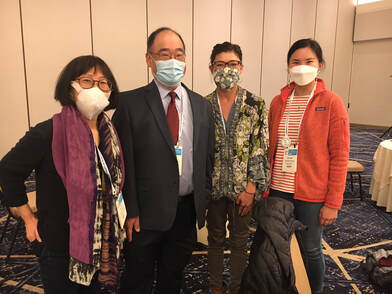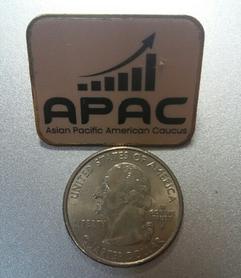The Asian Pacific American Caucus ("APAC," also known as the "Asian and Pacific Islander American Caucus") is a conference group of individuals who meet annually during professional meetings. Membership is free and open to all who share an interest in the teaching and learning of Asian Pacific American political affairs and community-based activism. Our members are typically affiliated with colleges and universities as faculty, staff, or graduate/undergraduate students. We also welcome partnership with community activists and organizational leaders. The APAC was co-founded in 1999 by Professors Andrew Aoki and Pei-te Lien as a related group of the American Political Science Association(APSA) that has a close relationship to the Race, Ethnicity, and Politics Section of the APSA. Starting in 2012, with the preparation and founding of the WPSA Committee on the Status of Asian Pacific Americans in the Profession, we have held a mini-conference on APA politics during WPSA meetings.
Membership in APAC is free. We manage the membership and communicate through a Google Group, so you can join APAC by going to our Asian Pacific American Caucus Google Group, then clicking on “Ask to join group.”
Job Announcements:
Interested in circulating your job notice to APAC members? Please contact Chinbo Chong, APAC secretary, who can help you with the arrangements. Because we are an entirely-volunteer run organization, we ask for a $25 donation to help us defer some of our costs. Thanks for your interest in APAC!
Interested in circulating your job notice to APAC members? Please contact Chinbo Chong, APAC secretary, who can help you with the arrangements. Because we are an entirely-volunteer run organization, we ask for a $25 donation to help us defer some of our costs. Thanks for your interest in APAC!
APAC at APSA Annual Meeting
in Philadelphia: September 5-September 8, 2024
APAC/APA Status Committee Sponsored Events
APAC Panel
Asian American Political Behavior: Diverse Communities and Methodologies
Friday, September 6: 8:00am-9:30am
APAC Business Meeting
Friday, September 6: 6:30pm-7:30pm
APSA Reception Honoring Women of Color in the Profession
Friday. September 6: 7:30pm-9:00pm
Joint Reception for APSA Status Committees, Caucuses, and REP Organized Section
Friday, September 6: 8:00pm-9:30pm
APAC Panel
Asian American Political Behavior: Diverse Communities and Methodologies
Friday, September 6: 8:00am-9:30am
APAC Business Meeting
Friday, September 6: 6:30pm-7:30pm
APSA Reception Honoring Women of Color in the Profession
Friday. September 6: 7:30pm-9:00pm
Joint Reception for APSA Status Committees, Caucuses, and REP Organized Section
Friday, September 6: 8:00pm-9:30pm
APAC at APSA Annual Meeting
in Los Angeles: August 31-September 2, 2023
APAC/APA Status Committee Sponsored Events
APAC Panels
Race, Gender, Ethnicity, and Views of/by Asian Americans
Thu, August 31, 4:00 to 5:30pm Virtual Panel
Breaking News: Examining CRT & DEI Mis(Dis)Information: The Intellectual, Policy, and Political Implications in the Academy and Beyond
Friday, September 1, LACC, 511B, at 10:00 a.m. to 11:30 a.m. Hybrid Panel
Asian American Politics: Race, Identity, and Political Behavior
Fri, September 1, 4:00 to 5:30pm Virtual Panel
APAC Business Meeting
Fri, September 1 5:30 to 6:30pm Virtual Panel
APA Status Committee Panel
Authors Meet Critics: Pei-te Lien and Nicole Filler’s Contesting the Last Frontier: Race, Gender, Ethnicity, and Political Representation of Asian Americans
Sat, September 2, 12:00 to 1:30pm Virtual Panel
APAC Panels
Race, Gender, Ethnicity, and Views of/by Asian Americans
Thu, August 31, 4:00 to 5:30pm Virtual Panel
Breaking News: Examining CRT & DEI Mis(Dis)Information: The Intellectual, Policy, and Political Implications in the Academy and Beyond
Friday, September 1, LACC, 511B, at 10:00 a.m. to 11:30 a.m. Hybrid Panel
Asian American Politics: Race, Identity, and Political Behavior
Fri, September 1, 4:00 to 5:30pm Virtual Panel
APAC Business Meeting
Fri, September 1 5:30 to 6:30pm Virtual Panel
APA Status Committee Panel
Authors Meet Critics: Pei-te Lien and Nicole Filler’s Contesting the Last Frontier: Race, Gender, Ethnicity, and Political Representation of Asian Americans
Sat, September 2, 12:00 to 1:30pm Virtual Panel
July 26, 2023 APAC Letter to APSA Council Regarding APSA 2023 Annual Meeting
Dear Members of the American Political Science Association Council:
The Asian Pacific American Caucus (APAC) of the American Political Science Association (APSA) is committed to creating and supporting spaces for more inclusive and expansive scholarship in our discipline on and by marginalized groups. For over two decades, the APAC has advanced this commitment by "leading the association in centering research and scholarship by and about Asian and Asian American communities," as APSA leaders noted in their letter condemning racist misogyny following the March 16, 2021 mass shootings targeting Asian immigrant women spa workers We urge the APSA to continue its leadership on addressing the multiple, intersecting roots of anti-Asian violence and exclusion, and respect Unite HERE Local 11's request to honor the thousands of striking hospitality workers in Los Angeles and relocate, cancel or move to a virtual format for the 2023 Annual Meeting online.
The APSA meeting siting policy states that meetings will be sited in locations that are welcoming and accessible to members of the association. For scholars of marginalized groups in politics, particularly those reflected in the thousands of Asian American, African American, Latina/o/x, and Pacific Islander immigrant women, men, and non-binary housekeepers, servers, attendants, and other hotel employees involved in the strike, holding the meeting at the JW Marriott Los Angeles LA Live is untenable and unjustifiable. As scholars who theorize, research, and write about Asians, Asian Americans, and Pacific Islanders pursuing political inclusion and transformation every day, the members of APAC would not view a meeting venue where workers from these same groups are picketing outside, and have directly asked us not to come, as either welcoming or accessible.
As co-chairs of the APAC, we call upon the APSA Council to act on our collective commitment to dignified working conditions for all workers, including those who make our Annual Meeting possible. We also recognize that this type of change is a disruption that may have significant consequences for members with limited conference and travel resources, and look forward to working with APSA leaders in the coming days to develop ways to support them.
Sincerely,
Dukhong Kim, [email protected]
Nicole Filler, [email protected]
APAC at WPSA 2023 Conference
Left photo: Evan Low receives a copy of "Contesting the Last Frontier: Race, Gender, Ethnicity, and Political Representation of Asian Americans" by Chair Pei-te Lien.PhD and Nicole Filler, PhD (2023). Right photo: Assemblymember Evan Low is featured keynote speaker at WPSA 2023 annual meeting.
Chair Pei-te Lien receives Don Nakanishi award at WPSA 2023
2023 WPSA Mini-Conference on Asian Pacific American Politics, April 7-8
Panel : 29.1 Asian Pacific American Politics for the 2020s: opportunities and challenges for empowerment and solidarity
Date : Friday, April 07, 08:00AM - 09:45AM
Chair(s) : Aoki, Andrew [email protected], Augsburg University
Papers :
Mobilizing the Racial In-Between: The Impact of Discrimination on Asian American Coalition Building
Chan, Stephanie, [email protected], Lafayette College
Chen, Sonya, [email protected], Princeton University
Explanatory Factors for Underreports of Sexual Harassment Among Asian American Women
Le, Loan, [email protected], Institute for Good Government & Inclusion
Kim, Eunice,=Stop AAPI Hate
Barquin, Alyssa, SFSU
Her, Mai Fou, SFSU
Ngo, Willy, SFSU
Asian American resentment against Blacks cannot merely be attributed to social conservatism
Lu, Fan, [email protected], Queen's University (Canada)
Situating Chinese Americans in the debate over affirmative action in college admissions
Lin , Shasha , [email protected], Heidelberg University
Discussant(s):
Junn, Jane – [email protected], University of Southern California
Lien, Pei-te [email protected], University of California, Santa
Barbara
Panel : 29.2 -Asian American Political Thought: Purpose, Problems, and Polemics
Date : Friday, April 07, 10:00AM - 11:45AM
Chair(s) : Ramesh, Hari, [email protected], Wesleyan University
Papers :
Reentering the Dragon: Revolutionary Consciousness and Theory in Asian Amerika
Aoki, Henry, [email protected], University of Southern California
Chinese Political Thought in Grace Lee Boggs's Political Thought: On the Challenges of Thinking Revolution Across Continents
Lee, Fred, [email protected], University of Connecticut
Citizens in and of exclusion: the political thought of Wong Chin Foo.
Liu, Glory, [email protected], Harvard University
Sources and Methods in the Study of Asian American Political Thought
Yan-Gonzales, Vivian , [email protected], University of Illinois Urbana- Champaign
Harmonious Instruction: Comparing the Political Aims of Confucian and Liberal Education
Pham , Kevin, [email protected],
Discussant(s): Lee, Fred - [email protected], University of Connecticut
Ramesh, Hari - [email protected], Wesleyan University
Panel : 33.15 -Keynote Speaker - California Assembly Member - Evan Low
Date : Friday, April 07, 12:00PM - 01:00PM
Panel : 29.3 - Asian Pacific American Political Identity and Representation
Date : Friday, April 07, 01:15PM - 03:00PM
Chair(s) : Chan, Stephanie, [email protected], Lafayette College
Papers :
Indigeneity, Identity, and Sense of Belonging among Chamoru in Guahan
Roberto, Joseph , [email protected], Hawaii Pacific University
Taijeron, Lauren , [email protected], University of Hawaii
Phan, Ngoc, [email protected] , Hawaii Pacific University
Second-Generation South Asian Americans and People of Color Identity
Mishra, Sangay, [email protected], Drew University
Asian Americans and Ethnic Studies Requirements in California
Bui, Karen, [email protected], University of California, Santa Barbara
Exploring the Contours of the 2.5 Generation in the Political Trajectories of Chinese Americans
Sun, Michael, [email protected], University of California Santa Barbara
Discussant(s):
Junn, Jane - [email protected], University of Southern California
Lu, Fan - [email protected], Queen's University (Canada)
Panel : 29.4 -Professional Development for Asian and Pacific Islander American Scholars in the Discipline
Date : Friday, April 07, 03:15PM - 05:00PM
Chair(s) : Mishra, Sangay, [email protected], Drew University
Discussant(s):
Junn, Jane – [email protected], University of Southern California
Leung, Vivien, [email protected], Bucknell University
Lu, Fan, [email protected], Queen's University (Canada)
Mishra, Sangay, [email protected], Drew University
Phillips, Christian, [email protected], University of Southern California
Panel : 29.5 -Asian Pacific American Politics in the City and Beyond
Date : Saturday, April 08, 08:00AM - 09:45AM
Chair(s) : Le, Loan, [email protected], Institute for Good Government & Inclusion
Discussant(s):
Aoki, Andrew, [email protected], Augsburg University
Geron, Kim, [email protected], California State University, East Bay
Lai, James, [email protected], Santa Clara University
Lien, Pei-te [email protected], University of California, Santa Barbara
Panel : 29.1 Asian Pacific American Politics for the 2020s: opportunities and challenges for empowerment and solidarity
Date : Friday, April 07, 08:00AM - 09:45AM
Chair(s) : Aoki, Andrew [email protected], Augsburg University
Papers :
Mobilizing the Racial In-Between: The Impact of Discrimination on Asian American Coalition Building
Chan, Stephanie, [email protected], Lafayette College
Chen, Sonya, [email protected], Princeton University
Explanatory Factors for Underreports of Sexual Harassment Among Asian American Women
Le, Loan, [email protected], Institute for Good Government & Inclusion
Kim, Eunice,=Stop AAPI Hate
Barquin, Alyssa, SFSU
Her, Mai Fou, SFSU
Ngo, Willy, SFSU
Asian American resentment against Blacks cannot merely be attributed to social conservatism
Lu, Fan, [email protected], Queen's University (Canada)
Situating Chinese Americans in the debate over affirmative action in college admissions
Lin , Shasha , [email protected], Heidelberg University
Discussant(s):
Junn, Jane – [email protected], University of Southern California
Lien, Pei-te [email protected], University of California, Santa
Barbara
Panel : 29.2 -Asian American Political Thought: Purpose, Problems, and Polemics
Date : Friday, April 07, 10:00AM - 11:45AM
Chair(s) : Ramesh, Hari, [email protected], Wesleyan University
Papers :
Reentering the Dragon: Revolutionary Consciousness and Theory in Asian Amerika
Aoki, Henry, [email protected], University of Southern California
Chinese Political Thought in Grace Lee Boggs's Political Thought: On the Challenges of Thinking Revolution Across Continents
Lee, Fred, [email protected], University of Connecticut
Citizens in and of exclusion: the political thought of Wong Chin Foo.
Liu, Glory, [email protected], Harvard University
Sources and Methods in the Study of Asian American Political Thought
Yan-Gonzales, Vivian , [email protected], University of Illinois Urbana- Champaign
Harmonious Instruction: Comparing the Political Aims of Confucian and Liberal Education
Pham , Kevin, [email protected],
Discussant(s): Lee, Fred - [email protected], University of Connecticut
Ramesh, Hari - [email protected], Wesleyan University
Panel : 33.15 -Keynote Speaker - California Assembly Member - Evan Low
Date : Friday, April 07, 12:00PM - 01:00PM
Panel : 29.3 - Asian Pacific American Political Identity and Representation
Date : Friday, April 07, 01:15PM - 03:00PM
Chair(s) : Chan, Stephanie, [email protected], Lafayette College
Papers :
Indigeneity, Identity, and Sense of Belonging among Chamoru in Guahan
Roberto, Joseph , [email protected], Hawaii Pacific University
Taijeron, Lauren , [email protected], University of Hawaii
Phan, Ngoc, [email protected] , Hawaii Pacific University
Second-Generation South Asian Americans and People of Color Identity
Mishra, Sangay, [email protected], Drew University
Asian Americans and Ethnic Studies Requirements in California
Bui, Karen, [email protected], University of California, Santa Barbara
Exploring the Contours of the 2.5 Generation in the Political Trajectories of Chinese Americans
Sun, Michael, [email protected], University of California Santa Barbara
Discussant(s):
Junn, Jane - [email protected], University of Southern California
Lu, Fan - [email protected], Queen's University (Canada)
Panel : 29.4 -Professional Development for Asian and Pacific Islander American Scholars in the Discipline
Date : Friday, April 07, 03:15PM - 05:00PM
Chair(s) : Mishra, Sangay, [email protected], Drew University
Discussant(s):
Junn, Jane – [email protected], University of Southern California
Leung, Vivien, [email protected], Bucknell University
Lu, Fan, [email protected], Queen's University (Canada)
Mishra, Sangay, [email protected], Drew University
Phillips, Christian, [email protected], University of Southern California
Panel : 29.5 -Asian Pacific American Politics in the City and Beyond
Date : Saturday, April 08, 08:00AM - 09:45AM
Chair(s) : Le, Loan, [email protected], Institute for Good Government & Inclusion
Discussant(s):
Aoki, Andrew, [email protected], Augsburg University
Geron, Kim, [email protected], California State University, East Bay
Lai, James, [email protected], Santa Clara University
Lien, Pei-te [email protected], University of California, Santa Barbara
APAC at WPSA's
75th Anniversary Conference
Photo 1: Placard and place setting for WPSA's 75th Conference Anniversary dinner celebration on March 11, 2022 in Portland, Oregon.
Photos 2 & 3: WPSA 2021-22 President Ricardo Ramirez and WPSA 2022-23 President Pei-Te Lien thank the Association and donors for making our meeting possible. Background slideshow includes images with highlights of past presidents.
Photo Source: Loan Le (c) APAC 2022
Photos 2 & 3: WPSA 2021-22 President Ricardo Ramirez and WPSA 2022-23 President Pei-Te Lien thank the Association and donors for making our meeting possible. Background slideshow includes images with highlights of past presidents.
Photo Source: Loan Le (c) APAC 2022
Photo 1: Pictured (Left to Right) WPSA 2021-22 President Ricardo Ramirez, WPSA Executive Director Richard Clucas, APSA 2021-22 President John Ishiyama, and WPSA 2022-23 President Pei-Te Lien just before Dr. Ishiyama delivers his talk on "Rethinking Political Science Education" on March 11, 2022 at WPSA's 75th Anniversary Conference & Celebration in Portland, OR.
Photo Source: Loan Le (c) APAC 2022
Photo Source: Loan Le (c) APAC 2022
|
(c) APAC 2022
|
Transition to Power Marks APAC High Moment, as members lead both APSA and WPSA simultaneously.
Photo 1: Pictured WPSA 2021-22 President Ricardo Ramirez (left) hands the gavel to WPSA 2022-23 President Pei-Te Lien (right), thereby transitioning power.
Photo 2: Pictured are Dr. Nicole Filler and Dr. Paul Watanabe with WPSA 2022 conference t-shirt with theme "The only conference I actually want to attend." |
|
WPSA Asian & Pacific Islander American (APIA) Mini-Conference & Special Events Schedule for Friday, March 11, 2022
29.1 -Virtual Roundtable: WPSA at 75 Years: Asian America in the Profession Date : Friday, WPSA APIA Mini-Conference 2022 (see below for schedule): 11, 08:00AM - 09:45AM Chair(s) : Takeda, Okiyoshi, [email protected], Aoyama Gakuin University, Tokyo Discussant(s): Aoki , Andy - [email protected], Augsburg University Filler, Nicole - [email protected], Highline College Junn, Jane - [email protected], University of Southern California Lien, Pei-te - [email protected], UCSB Watanabe, Paul - [email protected], University of Massachusetts, Boston Wong, Janelle - [email protected], University of Maryland Panel: 29.2 -Making Visible the experience of Native Hawaiians and other Pacific Islanders Date : Friday, March 11, 10:00AM - 11:45AM Chair(s) : Chong, Chinbo, [email protected], Indiana University Papers : Native Hawaiian Identity and Well-being through Cultural Reclamation Jara, Catherine, [email protected], Hawai'i Pacific University Phan, Ngoc, [email protected], Hawai'i Pacific University NÄ mea la’a a pau e pili ana i ke kuanaÊ»ike HawaiÊ»i: Interpreting sacredness through the KÄnaka ʻŌiwi (Native Hawaiian) worldview Dedrick, La'akea, [email protected], University of Hawai'i at MÄnoa Discussant(s): Chong, Chinbo - [email protected], Indiana University Special Event with APSA President Date: Friday, March 11, 2022, 12 to 1pm Talk on "Rethinking Political Science Education" |
Panel: 29.3 -Unpacking Asian Pacific American Politics thru Interdisciplinary Approaches
Date : Friday, March 11, 01:15PM - 03:00PM Chair(s) : Ngoc Phan - [email protected], Hawaii Pacific University Papers : Policy Congruence, Political Knowledge and Partisanship among Asian Americans Quan, Bang, [email protected], Florida International University Colonization and the Filipino-American Paradox Mateo, Janelle Ann, [email protected], Hawai'i Pacific University No Separate Peace: On Rights Radicalism and Intersectional Coalition Solidarity McCann, Michael, [email protected], University of Washington To flock or to flee? Xenophobia, racial lumping, and the paradox of Asian American collective behavior Chong, Chinbo, [email protected], Indiana University Okamoto, Dina, [email protected], Indiana University The Impact of Discrimination on Coalition-building: Asian Americans during COVID-19 Chen, Sonya, [email protected], Princeton University Chan, Stephanie, [email protected], Princeton University Discussant(s): Natalie Masuoka - [email protected], UCLA Panel : 29.4 -Virtual Panel: ''Asian American Connective Action in the Age of Social Media: Civic Engagement, Contested Issues, and Emerging Identities,'' by James Lai, Author Meets Critics Date: Friday, March 11, 03:15PM - 05:00PM Chair(s) : Le, Loan, [email protected], Institute for Good Government and Inclusion Author/Responder: Lai, James, [email protected], University of Santa Clara Discussant(s): Aoki , Andy - [email protected], Augsburg University Le, Loan - [email protected], Institute for Good Government and Inclusion Sadhwani, Sara - [email protected], Pomona College Wong, Janelle - [email protected], University of Maryland Panel : 29.5 -APAC Business Meeting Date : Friday, March 11, 05:00PM - 06:00PM |
APAC member now leads the APSA
Congratulations to President John Ishiyama, 2021-22!!
Celebrate: APAC members are playing major leadership roles in the APSA and WPSA. In addition to the presidency of Dr. Ishiyama, APAC co-founder Dr. Lien is program co-chair of the program co-chair of the 2022 APSA Meeting in Montreal, CAN https://connect.apsanet.org/apsa2022/. Dr. Lien is also the WPSA vice-president and chair of the 2022 WPSA meeting in Portland, OR, March 10-12 https://www.wpsanet.org/meeting/
Best paper award for APSA 2020 Race, Ethnicity, and Politics section
Winners: Chinbo Chong and Tanika Raychaudhuri, "Group-based belief systems about the racial order: Racial stereotypes and Asian American partisan identification."
Older News
CALL FOR PAPERS WPSA Mini-conference: Asian Pacific American Politics
Chairs: Loan K. Le, [email protected] and Ngoc Phan, [email protected]
The Asian and Pacific Islander American Caucus (APAC) and the Committee on the Status of Asian Pacific Americans in the Profession invite you to submit a proposal for the 2022 mini-conference on Asian Pacific American Politics. The APA mini-conference is set for Friday, March 11, 2022 during the annual meeting of the Western Political Science Association, which will be held at the Hilton Hotel on March 10 – 12, 2022, in Portland Oregon. Please make plans to attend and encourage others to join us!
This year’s WPSA conference theme is focused on “Lighting Up the New Dawn— Recover, Reconcile, and Rebuild @ 75,” which is particularly appropriate for the study of Asian Pacific Americans as violence, conflict and political pressures have been used to silence Asian Americans and other minority group voices particularly in the recent period.
Given a sharp surge in hate crimes affecting the Asian American community in 2020 and in 2021, the Atlanta area murders of six Asian origin women working at area spas, white supremacist efforts to galvanize racists by scapegoating Asians and Asian Americans for the pandemic, among other events, stereotypes regarding linear and model minority pathways to success are challenged. This year, we are challenged not only in politics vis-à-vis voting rates, media representation, equal protection, and many other forms of democratic inclusion but also in economic and educational success. We invite proposals that interrogate the lived experiences of Asian Pacific Americans, both for scholarship that fits within historical conceptualizations of race, ethnicity, and immigrant politics as well as scholarship that focuses on contemporary or current issues including but not limited to healing and empowerment opposite anti-Asian hate crimes. Suggested topics include but are not limited to various aspects of APA political participation and electoral fortunes; an understanding of Asian Americans with attention to the intersection of (multiple) identities; and assessment of the perceived challenges and advantages within the Asian American population in light of changing dynamics of political rhetoric and immigration enforcement in the United States.
We welcome full panel and roundtable proposals, too! The DEADLINE for submission of paper proposals/program participation forms is September 17, 2021. To apply, fill out the WPSA 2022 Request to Participate Form, http://wpsanet.org/app_panel/participation.php?year=2022 and submit your proposal to Section 29: Mini-Conference on Asian Pacific Americans (usually located near the bottom). In addition, if you would like to participate but need a bit more time to develop a proposal, we encourage you to contact us at this point and let us know. Write to Dr. Loan K. Le at [email protected]
Washington Post Article w/ Micro-syllabus
April 29, 2021
An article on Dr. Andy Aoki and Dr. Pei-te Lien's recent work on the teaching and learning of Asian American politics using a micro-syllabus was published in the Washington Post The microsyllabus consisted of articles published in the Politics, Groups, and Identities journal. In their words, 'Thanks again to everyone who has contributed to the journal and the syllabus. Feel free to repost and recirculate.'
Excerpt:
"While some people talk of Asian Americans as 'honorary Whites,' the recent spike in violence against Asian Americans — including a gunman killing eight people, six of them women of Asian descent, at Atlanta-area spas — remind us that this group too can be marginalized and attacked. As Margaret M. Chin and Yung-Yi Diana Pan explained here at TMC recently, the 'model minority' myth is part of the problem.So how do you un-model a minority? That requires understanding this population’s immense diversity and its complex place in the nation’s efforts to repair its racist past.
How to teach (or learn about) Asian American politics
Following a micro-syllabus on scholarship on Black Lives Matter, we created a micro-syllabus on Asian American politics, drawing on articles from the journal 'Politics, Groups, and Identities' (PGI)."
https://www.washingtonpost.com/politics/2021/04/28/how-un-model-minority-micro-syllabus-asian-american-politics/
TEACHING Asian Pacific American Politics
April 15, 2021
Dear colleague,
In response to a heightened interest in and awareness of the recent tragedies and ongoing violence against Asian Pacific Americans, we have created a micro-syllabus on teaching Asian American politics from research published by Politics, Groups, and Identities (PGI) between 2013 and 2021. Taylor & Francis, publisher of this WPSA journal, has kindly ungated 34 research articles and dialogue essays on the syllabus for circulation and free downloads until August 1, 2021. The micro-syllabus itself will remain available afterward. Please help share this opportunity with your network. Thank you.
Best,
Andrew Aoki & Pei-te Lien
WPSA 2021 APAC Mini-Conference Schedule
March 28, 2021 Update:
Please see below for the latest schedule regarding the Asian and Pacific Islander American Mini-Conference at the Western Political Science Association to be held on Friday, April 2, 2021. This year’s in-person meeting has been canceled and the meeting will be held via an online format only. People who would like to register for the conference are welcome to join us on for the online panels, roundtables and other meetings.
Friday April 02
08:00AM - 09:45 AM – PACIFIC TIME
Panel 30.01 Evaluating the Limits of Asian American Political Identity
Chair: Geron, Kim, California State University Eastbay
Discussant: Arora, Maneesh, Wellesley College
Papers:
Are We There Yet? Exploring Local Political Incorporation of Asian Americans in California
Filler, Nicole, Highline College
Gonzales, Francesa, University of California, Santa Barbara
Lien, Pei-te, University of California, Santa Barbara
Asian American Mobilization: The Effect of Co-Ethnic Candidates on Asian American Turnout
Sadhwani, Sara, Pomona College
One of Our Own? Why Asian American Candidates Cannot Count on Asian Voters
Lu, Fan, Queen's University
Friday April 02
10:00AM - 11:45 AM – PACIFIC TIME
Panel 30.02 Mobilizing Asian America: Civic Education and Political Activism
Chair: Raychaudhuri, Tanika, Princeton University
Discussant: Chong, Chinbo, University of Michigan
Papers:
Welcoming Asian Americans to the Party: The Benefits of Civic Education on the Acquisition of Partisanship
Chan, Nathan, The University of California, Irvine
Hoyt, Benjamin, University of California, Irvine
Explanatory Factors for Underreports of Sexual Harassment Among Asian American Women
Le, Loan, Institute for Good Government & Inclusion
Friday, April 02
12:00PM-01:00PM - PACIFIC TIME
WPSA-APASC and APAC Business Meeting
Friday April 02
01:15PM - 03:00PM – PACIFIC TIME
Panel 30.04 Historical and Contemporary Perspectives on Anti-Asian Attitudes and Behavior
Chair: Lai, James, Santa Clara University
Discussant: Aoki, Andrew, Augsburg University
Papers:
Anti-Asian Racism: Political Causes and Consequences
Kim, D.G., University of California, San Diego
Improvising 'Nonexistent Rights': Immigrants, Ethnic Restaurants, and Corporeal Citizenship in Suburban California
Lee, Charles, Arizona State University
Racial Formation and Pandemic: Examining the Shifts in Asian American Racial Identity During the COVID-19 Outbreak
Leung, Vivien, University of California, Los Angeles
Masuoka, Natalie, University of California, Los Angeles
Friday April 02
03:15PM - 05:00PM – PACIFIC TIME
Panel 30.05 Roundtable: Introducing Asian Pacific American Politics: ''Celebrating the Legacy of Don T. Nakanishi''
Chairs: Aoki, Andrew, Augsburg University & Lien, Pei-te, University of California, Santa Barbara
Participants:
Daus, Gem, University of Maryland
de Leon, Erwin, Columbia University
Lee, Charles, Arizona State University
Phillips, Christian, University of Southern California
Raychaudhuri, Tanika, Princeton University
Watanabe, Paul, University of Massachusetts Boston
Call for Proposals on the WPSA Mini-Conference on Asian Pacific American Politics (Deadline Friday, 10/09/20):
Introduction
The Asian and Pacific Islander American Caucus (APAC) invites you to submit a proposal for the 2021 mini-conference on Asian Pacific American Politics, which will be held on Friday, April 2, during the annual meeting of the Western Political Science Association, April 1-3, 2020 in Seattle, WA. We welcome all papers about Asian and Pacific Islander American politics. We encourage especially papers on the challenges of COVID-19 on Asian American and Pacific Islander Communities and Asian American mobilization around the 2020 election. We also encourage multi-method papers that innovate on how to study Asian American issues for which data are particularly scarce.
Background
This year’s WPSA conference theme is focused on “Populism, Nativism, Democratic Backsliding, and Pandemic Politics,” which is particularly appropriate for the study of Asian Pacific Americans as the November 2020 presidential election approaches and as we stand against the racism and discrimination that erupted after COVID-19 emerged. Times are changing but we still face enduring issues: Asian Americans confront the model minority myth of school and economic success while remaining marginalized in politics, media representation, equal protection, and many other forms of democratic inclusion. We invite proposals that interrogate the lived experiences of Asian Pacific Americans, both for scholarship that fits within historical conceptualizations of race, ethnicity, and immigrant politics as well as scholarship that focuses on contemporary or current issues.
Instructions
When you submit your proposal to WPSA online, please carefully scroll through the panel options and select the Mini-Conference on Asian Pacific Americans (usually located near the bottom). In addition, if you would like to participate but need a bit more time to develop a proposal, we encourage you to contact us at this point and let us know. Write to Dr. Loan K. Le at [email protected].
Please visit the Asian Pacific American Caucus website to find out more and the WPSA website to donate to the fund for Asian Pacific Americans.
Request: Please Check the APAC Box in Your MyAPSA
As some of you might have heard, APSA is beginning to implement a policy to monitor how many members each related group has. If we don't amass 35 APSA members by July 2021, the Asian Pacific American Caucus (APAC) will be severely harmed and might not be able to continue.
To become (renew) an APAC member (or certify your APAC membership), go to:
https://www.apsanet.org/User-Home/override/related and sign in.
Then check the boxes "Asian Pacific American Caucus" (and any other related groups as you like, such as Conference Group on Taiwan Studies, Indigenous Studies Network, Latino Caucus, LGBT Caucus, Women's Caucus, just to name a few). If the window for boxes does not open, look at the right column, see below "APSA resources," and click "Related Groups."
At this moment, there is no fee for checking boxes for related groups nor a limit of related groups you can check. But please note that your APSA membership and related group membership are concurrent. This means that if you renew your APSA membership between now and July 2021, we request you to come back to the related group checkbox page and check the boxes of APAC and other groups important to you. However, if you are a lifetime APSA member, you do not have to check the boxes every year, unless APSA tells you otherwise.
We would appreciate your help, as we have many individuals on our mailing list but who are not counted toward the number of APAC members by APSA because they are not APSA members.
Thank you very much in advance for your cooperation.
September 2020 Virtual Conference APAC (and the APA Status Committee) Panels and Business meeting
1. APAC panel: Multiple Perspectives on Asian Pacific American Politics
Sunday, September 13, 2:00pm MDT
Chair: Okiyoshi Takeda, Aoyama Gakuin University
Discussants: Natalie Masuoka, University of California, Los Angeles and Okiyoshi Takeda, Aoyama Gakuin University
Papers: Your English is So Good! Discrimination and Microaggressions in Asian America
Vivien Leung, University of California, Los Angeles
Asian American Women and Underreports of Sexual Harassment: New Survey Data Verify Patterns of Reluctance to Report Sexual Harassment
Loan Le, Institute for Good Government & Inclusion
Double-Edged Sword: The Model Minority and Perpetual Foreigner Stereotypes, Racial Triangulation, and Asian American Partisan Identification
Chinbo Chong, Princeton University and Tanika Raychaudhuri, University of Pennsylvania
2. APAC business meeting
Saturday, Sept. 12, 4:30 pm - 5:30 pm MDT
(APAC Bylaws available here.)
Winners: Chinbo Chong and Tanika Raychaudhuri, "Group-based belief systems about the racial order: Racial stereotypes and Asian American partisan identification."
Older News
CALL FOR PAPERS WPSA Mini-conference: Asian Pacific American Politics
Chairs: Loan K. Le, [email protected] and Ngoc Phan, [email protected]
The Asian and Pacific Islander American Caucus (APAC) and the Committee on the Status of Asian Pacific Americans in the Profession invite you to submit a proposal for the 2022 mini-conference on Asian Pacific American Politics. The APA mini-conference is set for Friday, March 11, 2022 during the annual meeting of the Western Political Science Association, which will be held at the Hilton Hotel on March 10 – 12, 2022, in Portland Oregon. Please make plans to attend and encourage others to join us!
This year’s WPSA conference theme is focused on “Lighting Up the New Dawn— Recover, Reconcile, and Rebuild @ 75,” which is particularly appropriate for the study of Asian Pacific Americans as violence, conflict and political pressures have been used to silence Asian Americans and other minority group voices particularly in the recent period.
Given a sharp surge in hate crimes affecting the Asian American community in 2020 and in 2021, the Atlanta area murders of six Asian origin women working at area spas, white supremacist efforts to galvanize racists by scapegoating Asians and Asian Americans for the pandemic, among other events, stereotypes regarding linear and model minority pathways to success are challenged. This year, we are challenged not only in politics vis-à-vis voting rates, media representation, equal protection, and many other forms of democratic inclusion but also in economic and educational success. We invite proposals that interrogate the lived experiences of Asian Pacific Americans, both for scholarship that fits within historical conceptualizations of race, ethnicity, and immigrant politics as well as scholarship that focuses on contemporary or current issues including but not limited to healing and empowerment opposite anti-Asian hate crimes. Suggested topics include but are not limited to various aspects of APA political participation and electoral fortunes; an understanding of Asian Americans with attention to the intersection of (multiple) identities; and assessment of the perceived challenges and advantages within the Asian American population in light of changing dynamics of political rhetoric and immigration enforcement in the United States.
We welcome full panel and roundtable proposals, too! The DEADLINE for submission of paper proposals/program participation forms is September 17, 2021. To apply, fill out the WPSA 2022 Request to Participate Form, http://wpsanet.org/app_panel/participation.php?year=2022 and submit your proposal to Section 29: Mini-Conference on Asian Pacific Americans (usually located near the bottom). In addition, if you would like to participate but need a bit more time to develop a proposal, we encourage you to contact us at this point and let us know. Write to Dr. Loan K. Le at [email protected]
Washington Post Article w/ Micro-syllabus
April 29, 2021
An article on Dr. Andy Aoki and Dr. Pei-te Lien's recent work on the teaching and learning of Asian American politics using a micro-syllabus was published in the Washington Post The microsyllabus consisted of articles published in the Politics, Groups, and Identities journal. In their words, 'Thanks again to everyone who has contributed to the journal and the syllabus. Feel free to repost and recirculate.'
Excerpt:
"While some people talk of Asian Americans as 'honorary Whites,' the recent spike in violence against Asian Americans — including a gunman killing eight people, six of them women of Asian descent, at Atlanta-area spas — remind us that this group too can be marginalized and attacked. As Margaret M. Chin and Yung-Yi Diana Pan explained here at TMC recently, the 'model minority' myth is part of the problem.So how do you un-model a minority? That requires understanding this population’s immense diversity and its complex place in the nation’s efforts to repair its racist past.
How to teach (or learn about) Asian American politics
Following a micro-syllabus on scholarship on Black Lives Matter, we created a micro-syllabus on Asian American politics, drawing on articles from the journal 'Politics, Groups, and Identities' (PGI)."
https://www.washingtonpost.com/politics/2021/04/28/how-un-model-minority-micro-syllabus-asian-american-politics/
TEACHING Asian Pacific American Politics
April 15, 2021
Dear colleague,
In response to a heightened interest in and awareness of the recent tragedies and ongoing violence against Asian Pacific Americans, we have created a micro-syllabus on teaching Asian American politics from research published by Politics, Groups, and Identities (PGI) between 2013 and 2021. Taylor & Francis, publisher of this WPSA journal, has kindly ungated 34 research articles and dialogue essays on the syllabus for circulation and free downloads until August 1, 2021. The micro-syllabus itself will remain available afterward. Please help share this opportunity with your network. Thank you.
Best,
Andrew Aoki & Pei-te Lien
WPSA 2021 APAC Mini-Conference Schedule
March 28, 2021 Update:
Please see below for the latest schedule regarding the Asian and Pacific Islander American Mini-Conference at the Western Political Science Association to be held on Friday, April 2, 2021. This year’s in-person meeting has been canceled and the meeting will be held via an online format only. People who would like to register for the conference are welcome to join us on for the online panels, roundtables and other meetings.
Friday April 02
08:00AM - 09:45 AM – PACIFIC TIME
Panel 30.01 Evaluating the Limits of Asian American Political Identity
Chair: Geron, Kim, California State University Eastbay
Discussant: Arora, Maneesh, Wellesley College
Papers:
Are We There Yet? Exploring Local Political Incorporation of Asian Americans in California
Filler, Nicole, Highline College
Gonzales, Francesa, University of California, Santa Barbara
Lien, Pei-te, University of California, Santa Barbara
Asian American Mobilization: The Effect of Co-Ethnic Candidates on Asian American Turnout
Sadhwani, Sara, Pomona College
One of Our Own? Why Asian American Candidates Cannot Count on Asian Voters
Lu, Fan, Queen's University
Friday April 02
10:00AM - 11:45 AM – PACIFIC TIME
Panel 30.02 Mobilizing Asian America: Civic Education and Political Activism
Chair: Raychaudhuri, Tanika, Princeton University
Discussant: Chong, Chinbo, University of Michigan
Papers:
Welcoming Asian Americans to the Party: The Benefits of Civic Education on the Acquisition of Partisanship
Chan, Nathan, The University of California, Irvine
Hoyt, Benjamin, University of California, Irvine
Explanatory Factors for Underreports of Sexual Harassment Among Asian American Women
Le, Loan, Institute for Good Government & Inclusion
Friday, April 02
12:00PM-01:00PM - PACIFIC TIME
WPSA-APASC and APAC Business Meeting
Friday April 02
01:15PM - 03:00PM – PACIFIC TIME
Panel 30.04 Historical and Contemporary Perspectives on Anti-Asian Attitudes and Behavior
Chair: Lai, James, Santa Clara University
Discussant: Aoki, Andrew, Augsburg University
Papers:
Anti-Asian Racism: Political Causes and Consequences
Kim, D.G., University of California, San Diego
Improvising 'Nonexistent Rights': Immigrants, Ethnic Restaurants, and Corporeal Citizenship in Suburban California
Lee, Charles, Arizona State University
Racial Formation and Pandemic: Examining the Shifts in Asian American Racial Identity During the COVID-19 Outbreak
Leung, Vivien, University of California, Los Angeles
Masuoka, Natalie, University of California, Los Angeles
Friday April 02
03:15PM - 05:00PM – PACIFIC TIME
Panel 30.05 Roundtable: Introducing Asian Pacific American Politics: ''Celebrating the Legacy of Don T. Nakanishi''
Chairs: Aoki, Andrew, Augsburg University & Lien, Pei-te, University of California, Santa Barbara
Participants:
Daus, Gem, University of Maryland
de Leon, Erwin, Columbia University
Lee, Charles, Arizona State University
Phillips, Christian, University of Southern California
Raychaudhuri, Tanika, Princeton University
Watanabe, Paul, University of Massachusetts Boston
Call for Proposals on the WPSA Mini-Conference on Asian Pacific American Politics (Deadline Friday, 10/09/20):
Introduction
The Asian and Pacific Islander American Caucus (APAC) invites you to submit a proposal for the 2021 mini-conference on Asian Pacific American Politics, which will be held on Friday, April 2, during the annual meeting of the Western Political Science Association, April 1-3, 2020 in Seattle, WA. We welcome all papers about Asian and Pacific Islander American politics. We encourage especially papers on the challenges of COVID-19 on Asian American and Pacific Islander Communities and Asian American mobilization around the 2020 election. We also encourage multi-method papers that innovate on how to study Asian American issues for which data are particularly scarce.
Background
This year’s WPSA conference theme is focused on “Populism, Nativism, Democratic Backsliding, and Pandemic Politics,” which is particularly appropriate for the study of Asian Pacific Americans as the November 2020 presidential election approaches and as we stand against the racism and discrimination that erupted after COVID-19 emerged. Times are changing but we still face enduring issues: Asian Americans confront the model minority myth of school and economic success while remaining marginalized in politics, media representation, equal protection, and many other forms of democratic inclusion. We invite proposals that interrogate the lived experiences of Asian Pacific Americans, both for scholarship that fits within historical conceptualizations of race, ethnicity, and immigrant politics as well as scholarship that focuses on contemporary or current issues.
Instructions
When you submit your proposal to WPSA online, please carefully scroll through the panel options and select the Mini-Conference on Asian Pacific Americans (usually located near the bottom). In addition, if you would like to participate but need a bit more time to develop a proposal, we encourage you to contact us at this point and let us know. Write to Dr. Loan K. Le at [email protected].
Please visit the Asian Pacific American Caucus website to find out more and the WPSA website to donate to the fund for Asian Pacific Americans.
Request: Please Check the APAC Box in Your MyAPSA
As some of you might have heard, APSA is beginning to implement a policy to monitor how many members each related group has. If we don't amass 35 APSA members by July 2021, the Asian Pacific American Caucus (APAC) will be severely harmed and might not be able to continue.
To become (renew) an APAC member (or certify your APAC membership), go to:
https://www.apsanet.org/User-Home/override/related and sign in.
Then check the boxes "Asian Pacific American Caucus" (and any other related groups as you like, such as Conference Group on Taiwan Studies, Indigenous Studies Network, Latino Caucus, LGBT Caucus, Women's Caucus, just to name a few). If the window for boxes does not open, look at the right column, see below "APSA resources," and click "Related Groups."
At this moment, there is no fee for checking boxes for related groups nor a limit of related groups you can check. But please note that your APSA membership and related group membership are concurrent. This means that if you renew your APSA membership between now and July 2021, we request you to come back to the related group checkbox page and check the boxes of APAC and other groups important to you. However, if you are a lifetime APSA member, you do not have to check the boxes every year, unless APSA tells you otherwise.
We would appreciate your help, as we have many individuals on our mailing list but who are not counted toward the number of APAC members by APSA because they are not APSA members.
Thank you very much in advance for your cooperation.
September 2020 Virtual Conference APAC (and the APA Status Committee) Panels and Business meeting
1. APAC panel: Multiple Perspectives on Asian Pacific American Politics
Sunday, September 13, 2:00pm MDT
Chair: Okiyoshi Takeda, Aoyama Gakuin University
Discussants: Natalie Masuoka, University of California, Los Angeles and Okiyoshi Takeda, Aoyama Gakuin University
Papers: Your English is So Good! Discrimination and Microaggressions in Asian America
Vivien Leung, University of California, Los Angeles
Asian American Women and Underreports of Sexual Harassment: New Survey Data Verify Patterns of Reluctance to Report Sexual Harassment
Loan Le, Institute for Good Government & Inclusion
Double-Edged Sword: The Model Minority and Perpetual Foreigner Stereotypes, Racial Triangulation, and Asian American Partisan Identification
Chinbo Chong, Princeton University and Tanika Raychaudhuri, University of Pennsylvania
2. APAC business meeting
Saturday, Sept. 12, 4:30 pm - 5:30 pm MDT
(APAC Bylaws available here.)
| apac_bylaws_september_2020.doc | |
| File Size: | 40 kb |
| File Type: | doc |
3. Asian Pacific American Status Committee panel Asian and Pacific Islanders in the Profession: Opportunities and Challenges for Current or Future Job Seeking Graduate Students, Post-docs, and New Tenure Track Faculty
Sun, September 13, 12:00 to 1:30pm MDT
Chair: Kim Geron, California State University, East Bay
Presenters: Maneesh Arora, Wellesley College
Hannah Kim, University of Nebraska, Omaha
Stacey Liou, University of Florida
Ngoc Phan, Hawaii Pacific University
APAC 20th Anniversary Symposium
At last year’s annual meeting (APSA September 2019 in Washington, DC), we celebrated our 20th anniversary with a symposium. Rogers Smith, president of APSA, gave opening remarks.
To commemorate our anniversary, we made tote bags and pins (note: to underscore how large a pin is, it is shown with a quarter).
Sun, September 13, 12:00 to 1:30pm MDT
Chair: Kim Geron, California State University, East Bay
Presenters: Maneesh Arora, Wellesley College
Hannah Kim, University of Nebraska, Omaha
Stacey Liou, University of Florida
Ngoc Phan, Hawaii Pacific University
APAC 20th Anniversary Symposium
At last year’s annual meeting (APSA September 2019 in Washington, DC), we celebrated our 20th anniversary with a symposium. Rogers Smith, president of APSA, gave opening remarks.
To commemorate our anniversary, we made tote bags and pins (note: to underscore how large a pin is, it is shown with a quarter).
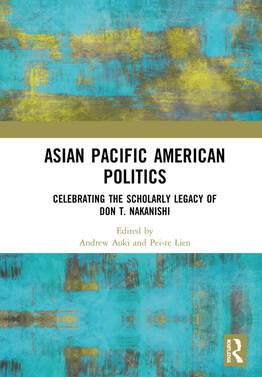
The process to publish this symposium in PS: Political Science and Politics is underway. We look forward to the 2021 publication (hopefully) of a PS symposium on Asian American politics. This will also commemorate the twentieth anniversary of the 2001 publication of an Asian American politics symposium in PS, the first time a political science journal had devoted a symposium to Asian American politics.
WPSA 2020 Mini-Conference on Asian Pacific Americans cancelled
Dear APAC/WPSA APIA Mini-Conference Community:
Following up on the WPSA's recent announcement to all members (https://www.wpsanet.org/), let me write to affirm that we will be canceling the Mini-Conference on APIA politics this year. What I see is that faculty and staff are scrambling to get their courses online (and many have never held online courses, so it's an enormous undertaking done well) and to take care of their families when schools/activities/resources have shut down, so after discussion with others, we made the choice not to hold our mini-conference.
If some of you are interested in participating in the optional online conference to be held May 21-23, 2020, I think there may be an opportunity to re-organize within the main WPSA online conference. WPSA is expected to issue guidance on how to participate in the virtual conference. You can participate in the 2020 online conference for no additional fee regardless of how you decide to allocate your conference registration fees. Participation in the online conference is entirely up to you; either decision works out fine for APAC.
Some people have been able to support WPSA by donating their registration fees (this is wonderful if you can allocate for that, although we also recognize that it may be a difficult time financially for association members).
Stay safe and well everyone.
Best wishes,
Dr. Loan Le (March 25, 2020)
Announcing book publication Asian Pacific American Politics—Celebrating the Scholarly Legacy of Don T. Nakanishi (Routledge 2020).
Arguably, the book comprises the most comprehensive and updated collection of works in the field. Click here or see below for the book description as well as for the table of contents.
Publisher Book Description
Asian Pacific American Politics presents some of the most recent research on Asian American politics, including both quantitative and qualitative examinations of the role of Asian and Pacific Islander Americans in some of today’s major political controversies.
In the highly polarized politics of the United States in the early 21st century, non-Black racial minorities such as Asian Americans and Pacific Islander Americans will increasingly find themselves swept into the epicenter of many of the divisive controversies. This timely volume presents the latest scholarly research on some of these issues, examining questions such as Asian American support for #Black Lives Matter, responses to racially-charged attacks, and the differences in the political socialization, politicization, and community-based activism within and across sectors of the Asian American population. In addition to examining political identity, voting participation, political mobilization, transnational politics, and partisan formation, the volume also investigates important, but little discussed, issues such as the Native Hawaiian sovereignty movement, political incorporation of Filipino Americans, and the struggle to establish "comfort women" memorials in the United States. Contributors also examine, through dialogues, how Asian Americans fit into the larger world of American racial politics, the extent to which they are likely to build coalitions with other communities of color, and the boundaries and contours of Asian American political theory.
Exploring and Expanding the Political World Pioneered by Don T. Nakanishi, Asian Pacific American Politics will be of great interest to scholars of race and ethnicity in American politics, immigration and minority incorporation, ethnic identity politics, and political participation and democratic inclusion of Asians. The chapters were originally published in Politics, Groups, and Identities.
Table of Contents
Introduction
Exploring and expanding the political world pioneered by Don T. Nakanishi by Andrew Aoki and Pei-te Lien
Research Articles
1. Race-ing solidarity: Asian Americans and support for Black Lives Matter by Julie Lee Merseth
2. From emotion to action among Asian Americans: assessing the roles of threat and identity in the age of Trump by Davin L. Phoenix and Maneesh Arora
3. Superficial Equality: Gender and immigration in Asian American political participation by Christian Dyogi Phillips and Taeku Lee
4. The social roots of Asian American partisan attitudes by Tanika Raychaudhuri
5. Coalition building and mobilization: case studies of the comfort women memorials in the United States by Mary M. McCarthy and Linda C. Hasunuma
6. Does Christopher Chen Vote More Than Shu-Wei Chen? The Cost of Ethnic Retention among Asian America Voters by Min Hee Go
7. Party Identification and the Immigrant Cohort Hypothesis: The Case of Vietnamese Americans by Loan Kieu Le and Phi Hong Su
8. The Role of Co-Ethnic Political Mobilization in Electoral Incorporation: Evidence from Orange County, California by Carole Jean Uhlaner and Danvy Le
9. When Does Race Matter? Exploring White Responses to Minority Congressional Candidates by Neil Visalvanich
10. The Effect of Party Mobilization, Group Identity, and Racial Context on Asian Americans’ Turnout by Dukhong Kim
Dialogue Essays: Doing, Learning, and Thinking about Asian Pacific American Politics
11. Filipino American political participation by Erwin S. de Leon and Gem P. Daus
12. "Now we know": resurgences of Hawaiian independence by Noelani Goodyear-Ka’opua
13. Intersectional perspectives on Asian Pacific American activism and movement building by Nicole Filler
14. Are ballot box issues enough? Nakanishi’s indication and the case for Asian Pacific American transnational Politics in an age of domestic disruption by Christian Collet
15. How far have we come? Asian Pacific Americans in introductory American government textbooks in three different time periods by Okiyoshi Takeda
Dialogue within Dialogue
16. Contours of Asian American political theory: introductions and polemics by Fred Lee
17. Commentary on Fred Lee’s "Contours of Asian American Political Theory: Introductions and Polemics" by Charles T. Lee
18. Reflections on Fred Lee’s "Contours of Asian American Political Theory: Introductions and Polemics" by Edmund Fong
19. When Race No Longer Predicts Minority Status and Identity by Pei-te Lien
20. Asian Americans and the Rainbow: The Prospects and Limits of Coalitional Politics by Karthick Ramakrishnan
Review Essay
21. Asian Americans and politics: communities and research transformed by Paul Y. Watanabe
Image Source: Cover to Book Asian Pacific American Politics—Celebrating the Scholarly Legacy of Don T. Nakanishi (Routledge 2020).
WPSA 2020 Mini-Conference on Asian Pacific Americans cancelled
Dear APAC/WPSA APIA Mini-Conference Community:
Following up on the WPSA's recent announcement to all members (https://www.wpsanet.org/), let me write to affirm that we will be canceling the Mini-Conference on APIA politics this year. What I see is that faculty and staff are scrambling to get their courses online (and many have never held online courses, so it's an enormous undertaking done well) and to take care of their families when schools/activities/resources have shut down, so after discussion with others, we made the choice not to hold our mini-conference.
If some of you are interested in participating in the optional online conference to be held May 21-23, 2020, I think there may be an opportunity to re-organize within the main WPSA online conference. WPSA is expected to issue guidance on how to participate in the virtual conference. You can participate in the 2020 online conference for no additional fee regardless of how you decide to allocate your conference registration fees. Participation in the online conference is entirely up to you; either decision works out fine for APAC.
Some people have been able to support WPSA by donating their registration fees (this is wonderful if you can allocate for that, although we also recognize that it may be a difficult time financially for association members).
Stay safe and well everyone.
Best wishes,
Dr. Loan Le (March 25, 2020)
Announcing book publication Asian Pacific American Politics—Celebrating the Scholarly Legacy of Don T. Nakanishi (Routledge 2020).
Arguably, the book comprises the most comprehensive and updated collection of works in the field. Click here or see below for the book description as well as for the table of contents.
Publisher Book Description
Asian Pacific American Politics presents some of the most recent research on Asian American politics, including both quantitative and qualitative examinations of the role of Asian and Pacific Islander Americans in some of today’s major political controversies.
In the highly polarized politics of the United States in the early 21st century, non-Black racial minorities such as Asian Americans and Pacific Islander Americans will increasingly find themselves swept into the epicenter of many of the divisive controversies. This timely volume presents the latest scholarly research on some of these issues, examining questions such as Asian American support for #Black Lives Matter, responses to racially-charged attacks, and the differences in the political socialization, politicization, and community-based activism within and across sectors of the Asian American population. In addition to examining political identity, voting participation, political mobilization, transnational politics, and partisan formation, the volume also investigates important, but little discussed, issues such as the Native Hawaiian sovereignty movement, political incorporation of Filipino Americans, and the struggle to establish "comfort women" memorials in the United States. Contributors also examine, through dialogues, how Asian Americans fit into the larger world of American racial politics, the extent to which they are likely to build coalitions with other communities of color, and the boundaries and contours of Asian American political theory.
Exploring and Expanding the Political World Pioneered by Don T. Nakanishi, Asian Pacific American Politics will be of great interest to scholars of race and ethnicity in American politics, immigration and minority incorporation, ethnic identity politics, and political participation and democratic inclusion of Asians. The chapters were originally published in Politics, Groups, and Identities.
Table of Contents
Introduction
Exploring and expanding the political world pioneered by Don T. Nakanishi by Andrew Aoki and Pei-te Lien
Research Articles
1. Race-ing solidarity: Asian Americans and support for Black Lives Matter by Julie Lee Merseth
2. From emotion to action among Asian Americans: assessing the roles of threat and identity in the age of Trump by Davin L. Phoenix and Maneesh Arora
3. Superficial Equality: Gender and immigration in Asian American political participation by Christian Dyogi Phillips and Taeku Lee
4. The social roots of Asian American partisan attitudes by Tanika Raychaudhuri
5. Coalition building and mobilization: case studies of the comfort women memorials in the United States by Mary M. McCarthy and Linda C. Hasunuma
6. Does Christopher Chen Vote More Than Shu-Wei Chen? The Cost of Ethnic Retention among Asian America Voters by Min Hee Go
7. Party Identification and the Immigrant Cohort Hypothesis: The Case of Vietnamese Americans by Loan Kieu Le and Phi Hong Su
8. The Role of Co-Ethnic Political Mobilization in Electoral Incorporation: Evidence from Orange County, California by Carole Jean Uhlaner and Danvy Le
9. When Does Race Matter? Exploring White Responses to Minority Congressional Candidates by Neil Visalvanich
10. The Effect of Party Mobilization, Group Identity, and Racial Context on Asian Americans’ Turnout by Dukhong Kim
Dialogue Essays: Doing, Learning, and Thinking about Asian Pacific American Politics
11. Filipino American political participation by Erwin S. de Leon and Gem P. Daus
12. "Now we know": resurgences of Hawaiian independence by Noelani Goodyear-Ka’opua
13. Intersectional perspectives on Asian Pacific American activism and movement building by Nicole Filler
14. Are ballot box issues enough? Nakanishi’s indication and the case for Asian Pacific American transnational Politics in an age of domestic disruption by Christian Collet
15. How far have we come? Asian Pacific Americans in introductory American government textbooks in three different time periods by Okiyoshi Takeda
Dialogue within Dialogue
16. Contours of Asian American political theory: introductions and polemics by Fred Lee
17. Commentary on Fred Lee’s "Contours of Asian American Political Theory: Introductions and Polemics" by Charles T. Lee
18. Reflections on Fred Lee’s "Contours of Asian American Political Theory: Introductions and Polemics" by Edmund Fong
19. When Race No Longer Predicts Minority Status and Identity by Pei-te Lien
20. Asian Americans and the Rainbow: The Prospects and Limits of Coalitional Politics by Karthick Ramakrishnan
Review Essay
21. Asian Americans and politics: communities and research transformed by Paul Y. Watanabe
Image Source: Cover to Book Asian Pacific American Politics—Celebrating the Scholarly Legacy of Don T. Nakanishi (Routledge 2020).
